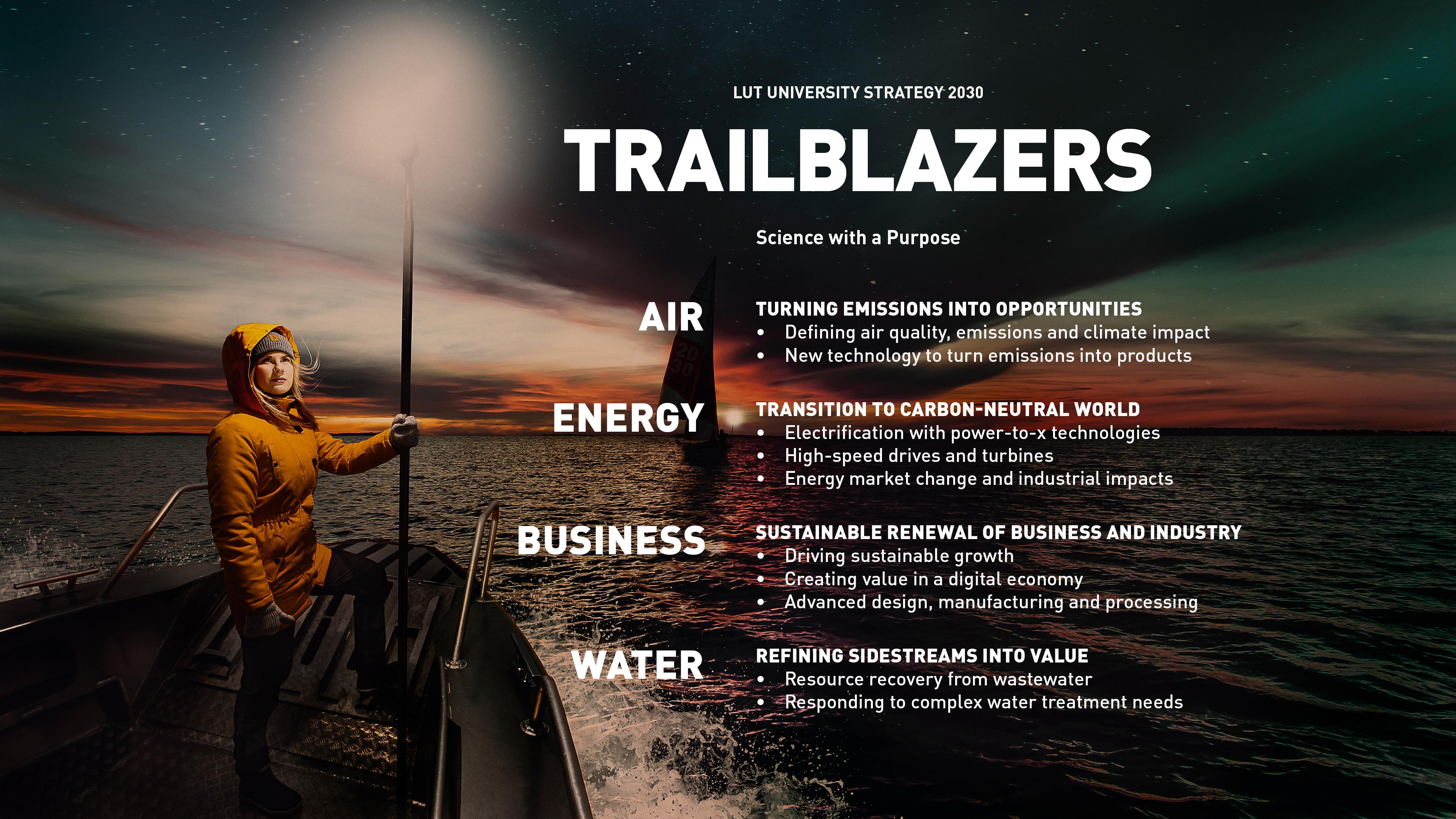Research platforms – a strong strategic steering mechanism
As mentioned in LUT’s self-assessment, its research is focused on seeking new sustainable solutions in clean energy, water and air in its fields of technology and business as well as on supporting society and businesses in their sustainable renewal. LUT’s research, development and innovation activities (RDI) target dually on the global level phenomena, aiming for global impact, and to the local level mainly via research, development and innovation activities with businesses diversifying the impact of its activities.
The core of LUT’s research activities is its five multidisciplinary research platforms that are strongly linked to its strategy and the related impact it is striving for. The research platforms appear as a strong strategic steering mechanism of research. Two internal open calls for proposals with external review panels have been organised for selecting the research platforms. LUT has organised two research and impact assessment exercises in 2012 and 2019, each conducted by an international panel of experts. The assessments have been connected to the strategic development of LUT and its research platforms. As mentioned in the interviews, the latest assessment of 2019 was timed so that it contributed to the strategy process of LUT, and outcomes and development ideas of the assessment have been used in defining the focus areas for research and also to develop the steering.
Based on the audit visit, it was very clear that the strategic focus areas of research and strategic objectives also strongly steer LUT’s RDI activities in terms of collaborations and partnerships with businesses. LUT has several functioning mechanisms for RDI activities that build on utilising the research conducted at LUT, creating new innovation and commercialising its research results. Research breakthroughs for business is an area where LUT is seeking to further improve. The number of start-ups, spin-offs and patents used is based on the interviews some of the good follow-up indicators of the societal impact of LUT’s research. The university seems to have found a balance in combining academic rigour and a high level of research with company collaboration in research.
As already discussed, roles and responsibilities, core processes, assessment indicators and procedures for improving the quality of societal engagement and impact—but also research activities more widely—have been clearly defined. As in LUT’s activities in general, the university has set clear strategic targets, actions, support structures and relevant assessment indicators for its RDI activities and their impact. The continuous collection of information on meeting these targets, reporting and checkpoints for reviewing the actions taken combined with an external assessment of LUT’s strategic research platforms underline the consistent strategic management of research activities. In terms of research and its societal impact, improvements and a re-direction of activities have been done, especially as part of the more long-term strategic development processes and based on international assessments.
Procedures are in place to enhance open science
LUT is committed to open science, which it considers as one way to increase the societal impact of its research. Open science is highlighted as one action point in the university’s strategic action plan for research. The targets are 100% open access to scientific publications and an increase in the publishing of metadata. The aim is to make parallel publishing and open research metadata a standard procedure for all researchers. LUT has clear policies and procedures to promote the publishing of open access publications and research data. The library provides proactive guidance and support. Based on the guidelines, the research plan should include both a data management plan and how the results are published. Internal incentives have been attached to the publishing of scientific journals and open access publishing. Staff receive a bonus if they publish an article in a scientific journal (JUFO 2 and 3), but only if the article is published as an open-access publication. The level of open science is at a good level at LUT. However, in order to achieve its targets, further measures are needed, such as multiple information channels to reach all researchers and making sure open access is included in research planning and budgeting.
A more proactive approach to research ethics is proposed
Research ethics is one of the core processes of research at LUT. LUT has guidance and procedures in place to ensure that students and researchers conduct research responsibly. As mentioned, courses in research ethics and discussion seminars on responsible conduct of research are organised mainly for doctoral students, but they are also available for staff. For ethical reviews and statements and for clear violations of responsible conduct or allegations for misconduct in research, LUT has clear procedures that follow the national ethical guidelines of the Finnish National Board on Research Integrity TENK. The university could benefit from ensuring that research ethics are considered as precautionary measures and introduced in the early stages of both research planning and researcher career.
LUT follows its strategy also in communication activities. The support provided by Communications and Marketing is two-sided: helping LUT researchers and experts to communicate their results and in return helping media to find LUT and its experts. The university’s visibility in traditional and social media is followed and reported. The action plan also has action targets to enhance the publication and communication of research results and the influence of its research teams in scientific decision-making. Enhancing the information flow between research teams and Communications and Marketing, training of researchers, providing examples of best practices and regularly recognising significant communication and the media success of researchers are some of the measures taken. LUT schools have dedicated communications officers to enhance the dissemination of research results to the public.
